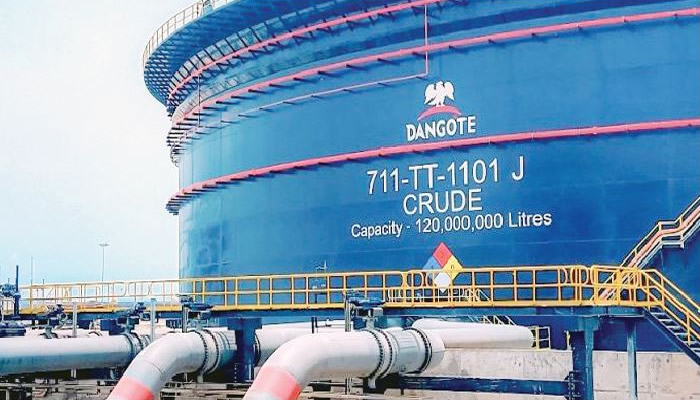The Project Management Institute (PMI) has lauded the Dangote Refinery for its remarkable execution, describing it as a model of effective project management and a transformative infrastructure milestone for Africa. The global professional body for project managers said the successful completion and commissioning of the multi-billion-dollar refinery reflect world-class coordination, planning, and leadership that align with international standards.
In a statement, PMI praised the refinery’s project execution team for delivering one of the largest industrial complexes in the world despite multiple challenges, including logistics, financing, supply chain disruptions, and the COVID-19 pandemic. According to PMI, the Dangote Refinery demonstrates “Africa’s capacity to execute complex, large-scale projects that meet global standards,” emphasizing that it has become a symbol of African innovation, resilience, and technical excellence.

The $20 billion Dangote Refinery, located in the Lekki Free Trade Zone in Lagos, is the world’s largest single-train refinery with a processing capacity of 650,000 barrels of crude oil per day. PMI highlighted the scale and complexity of the project, noting that it involved over 40,000 workers, more than 10,000 equipment items, and contractors from over 50 countries. Despite the project’s magnitude, it achieved delivery milestones that place it among the most efficiently managed energy infrastructure projects globally.
Speaking on the recognition, PMI’s Regional Director for Africa, George Asamani, said the Dangote Refinery embodies the strategic principles of project management excellence. He commended the refinery’s leadership team, particularly Aliko Dangote, for demonstrating vision and discipline in steering such a vast and complex undertaking to completion.
“Managing a project of this magnitude requires extraordinary alignment between planning, execution, and stakeholder management,” Asamani said. “The Dangote Refinery shows that with structured methodologies, strong governance, and leadership commitment, Africa can deliver mega projects that rival any in the world.”
He added that PMI’s recognition underscores the importance of adopting modern project management standards in Africa’s industrial and infrastructural development. The institute said the refinery’s execution strategy—built on modular construction, integrated scheduling, and real-time monitoring systems—could serve as a case study for other emerging economies seeking to deliver transformative infrastructure projects efficiently.
PMI also noted that the refinery represents a powerful model for sustainable industrialization and regional self-sufficiency. With the facility now producing diesel, aviation fuel, and other refined products, Nigeria is expected to reduce its dependence on imported petroleum products while boosting foreign exchange earnings through exports.
The institute highlighted the project’s social and economic impact, particularly its contribution to job creation, technology transfer, and capacity building. Over 30,000 Nigerians reportedly worked on the project during peak construction, gaining hands-on experience in large-scale engineering, logistics, and project supervision. “This is not just a refinery; it is a living example of knowledge transfer and human capital development,” PMI stated.
Industry experts have equally applauded the recognition, noting that the Dangote Refinery stands as a benchmark for infrastructure project delivery in Africa. They argue that the project has demonstrated how effective planning, private-sector leadership, and technical innovation can overcome systemic challenges in developing economies.
The refinery’s success, they added, is expected to inspire other large-scale ventures in energy, transportation, and manufacturing sectors. The adoption of PMI methodologies, including risk management frameworks, agile scheduling, and performance-based governance, played a crucial role in ensuring the refinery’s timely and efficient completion.
In his remarks following PMI’s commendation, Aliko Dangote, Chairman of the Dangote Group, expressed gratitude to the institute for recognizing the refinery’s execution excellence. He noted that the project’s success reflects the power of Nigerian and African ingenuity when combined with world-class project management practices.
“This recognition by PMI reaffirms our belief that Africa can execute projects of any magnitude with the right mix of vision, planning, and discipline,” Dangote said. “Our goal has always been to build a refinery that would serve as a catalyst for industrial growth, energy security, and national development.”
Dangote added that the refinery’s impact goes beyond energy supply—it represents a shift in Africa’s economic narrative from dependency to productivity. The project, he said, will continue to support Nigeria’s quest for self-sufficiency in refined products, enhance its trade balance, and stimulate downstream industries such as petrochemicals and fertilizers.
Observers say PMI’s recognition of the Dangote Refinery sends a strong signal to international investors that Africa is capable of managing large-scale, technically demanding projects effectively. It also highlights the growing importance of professional project management standards in driving sustainable development across the continent.
As the refinery ramps up full production and prepares for global market exports, PMI emphasized that its recognition is not only for the successful execution but also for the example it sets for future infrastructure development in Africa. The Dangote Refinery, it said, is “a beacon of what disciplined project management, visionary leadership, and African determination can achieve.”
Support InfoStride News' Credible Journalism: Only credible journalism can guarantee a fair, accountable and transparent society, including democracy and government. It involves a lot of efforts and money. We need your support. Click here to Donate
